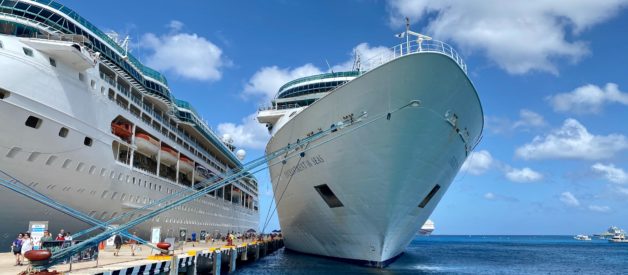In international voyages, passenger ships – typically defined as ships carrying more than 12 passengers – must comply with all relevant IMO regulations, including those contained in SOLAS and cargo line agreements.
Royal Caribbean Voyager of the SeasPassenger vessels in operation today are subject to a number of rules and standards that cover all aspects of the construction and operation of vessels. Several events over the years have led to improved safety requirements, including problems with fire-fighting measures – such as escape routes and large atrium fire-fighting systems typical of cruise ships – as well as life-saving facilities and arrangements.
In addition to improvements in technical regulations, the entry into force of the International Safety Management (ISM) Code for passenger ships in 1998 was an important step in focusing on the “human part” of shipping, providing an international standard for safe management and ship operation and pollution prevention. The entry into force on 1 February 1997 (gradually in 2002 until 2002) of the 1995 amendments to the International Convention on Standards of Training, Certification and Watchkeeping for Seafarers paved the way for a significant improvement in seafarers’ standards and gave the IMO the power to monitor compliance. The STCW Convention, as amended since 1995, contains specific requirements for crews of passenger ships, such as public hearing training for emergency evacuation.
Large passenger ships can generate huge amounts of waste – the provisions on waste and wastewater management can be found in MARPOL 73/78.
Ro-ro ferries; High-speed vessels and new vessels, such as the Wig on Land engine, all have special safety considerations.
Safety of passenger ships – significant work completed
At its 82nd meeting in November-December 2006, the Committee on Safe Seas (MSC) adopted a package of changes to SOLAS as a result of a comprehensive review of the safety of passenger ships launched in 2000 so that the current rules can be adequately assessed, especially for the largest passengers. ships are under construction.
The development of new and changed rules has based its guiding philosophy on two premises: the rules must emphasize the prevention of victim commencement and that future passenger ships must be designed for better survival so that people in distress can stay safe on board when the ship enters port.
The changes include new concepts, such as the inclusion of accident limit values (damage that a ship can withstand according to the design basis and still return safely to port) in Chapters II-1 and II-2 of SOLAS. The changes also provide flexibility in legislation to allow shipbuilders to meet any safety challenges that may arise in the future. The changes include the following:
Alternative models and arrangements.
Safe areas and important systems must be maintained as the ship continues to land after an accident, requiring the interruption of thrust and other important systems.
an on-board security center from which security systems can be controlled, operated and monitored
Fixed fire detection and alarm systems, including requirements for fire detectors and manually operated alarm centers for external and individual identification of fire safety, including changes to improve atrium fire safety, means of evacuation of fire and ventilation systems. And
Time for proper evacuation and abandonment, including requirements for essential systems that must remain operational if any of the main vertical zones are unusable due to fire. The changes are expected to take effect on July 1, 2010.
Work on passenger ship safety has based its leading philosophy on the premise that the rules should place more emphasis on preventing victims of accidents from starting and that future passenger ships should be designed to improve resilience so that people can stay safe on board if an accident occurs, continue to port.
With regard to the five pillars of the Committee’s leading philosophy for passenger ship safety, the following objectives have been achieved since work began in 2000:
Birth control:
Amendments to the SOLAS and STCW Conventions and support guidelines focusing on fire protection, maritime safety, training and contingency planning.
Better survival:
SOLAS group II-1 and II-2 changes and support systems focusing on major systemic emergencies, emergency management and accident reduction.
